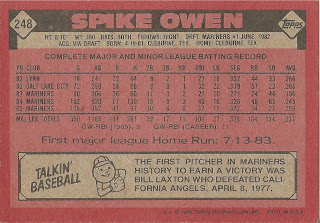Card thoughts: “Spike” and “Butch”: Always nicknames of the “tough” kids in juvenile adventure stories. But for Spike Owen, Spike was his real name.
The player:
Spike Owen was a number 1 draft pick by the Mariners after starring at the University of Texas. He sped through the minors in two
years, not necessarily because he excelled (he hit only .266 over 150 games),
but more because the Mariners were a terrible team that really needed a good
shortstop. Owen took over in 1983 for Todd Cruz as the starting shortstop, but
he only hit .196. The next year was better, as he had a career high 530 at bats
and hit .249, to go with 16 steals. The next two seasons saw similar numbers
for Owen, but they liked the Red Sox starting shortstop, Rey Quinones better,
so the two were swapped for each other near the end of the 1986 season.
Neither player hit particularly well for their new teams,
but Owen redeemed himself in the playoffs, hitting .429 in the ALCS and .300 in
the World Series. In the subsequent 2 seasons as a starting shortstop for the
Boston Red Sox, Owen performed to his norms, hitting about .245 a year and
playing a good shortstop.
In 1989, Owen was once again traded for a younger shortstop
(this time Luis Rivera of the Expos). He was well suited to the National
League. As the eighth place hitter, Owen walked at least 70 times in both 1989
and 1990, and rarely struck out. This somewhat made up for batting around .230
both seasons. The move back to artificial turf also improved his fielding—Owen
established a National League record by having 63 straight errorless games at
shortstop in 1990.
Although his average improved to .269 (his career high at
that point), and he continued to be an above average fielder, the Expos did not
resign him after the 1992 season. For yet another time, Owen was replaced by a
younger option with more potential, this time by Wil Cordero (who was a wife
beater, and became one of the all-time loathed baseball players).
Owen signed a three year, highly paid contract with the
Yankees, when they gave those out to every willing veteran. But he only lasted
one season with the Bronx Bombers, and had to fight for playing time at short
with a motley collection of spare parts, including Mike Gallego and Randy
Valarde. Wanting to dump the very expensive, and rapidly aging, Owen, the Yanks
pawned him off on the Angels for anonymous minor leaguer Jose Musset (21 saves
at Midland that
year, but a 5.49 ERA—never made the majors).
Owen had a good capstone to the last two years of his
career, hitting a career best .310 in 1993 while starting at third base for the
first time. A .229 average in 1995, and the expiration of his contract,
signaled the end of the line for Owen.
Owen coached for many years with the Round Rock Express, the
AA farm club Astros, and later the AAA club for the Rangers. He has a baseball
stadium named after him in Bay View, Ohio.
Bill Laxton only had 3 wins in his entire career, which was a spotty one, as he lost 10 games. His win came in relief of Tommy Moore who blew a save, although Laxton's 2 walks led to that blown save. I believe Laxton only had one card in 1977 that showed him airbrushed into a Mariners hat.


No comments:
Post a Comment